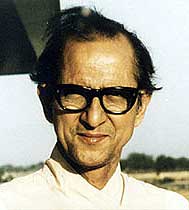Reading between the lines of these entries from BP Koirala's diary written in English during his solitary confinement at Sundarijal, one gets the feeling that his energy is sapped by medical and psychological conditions. The entry for 25 April is a detailed and lyrical description of the birds that take shelter outside his cell. The day before, he analysed the role of monarchies in modern states in words that seem very prescient given the present polarisation between the palace and parties.
 Sunday, 24 April 1977
Sunday, 24 April 1977
Sundarijal
The study of the growth + decline of the institution of monarchy would be both interesting, profitable + relevant in Nepal's context. The institution itself has not been designed or devised on a single universal pattern-although the authority of a monarch was universally unquestioned, the authority itself was derived + vested from different sources. Some institutional, some traditional + conventional checks perhaps operated on the absolutism of monarchy in the past. The fear of popular revolt was also there, because the state's monopoly of weapons of war was not so total as it is today. Moreover, the very feudal character of the administration with its complement of inefficiency and looseness and the penetration of the state into the lives of citizens not being as deep and extensive as it is today-these provided some freedom to the people even in the most autocratic kings of the past.
It will be interesting to study the checks and balances that operated in former monarchies. A further study should be directed towards the classification of this institution in modern times with reference to its context. There are so many monarchial states even today: the English, Japanese, Scandinavian, Arab, Hindu, Thai, Iranian, Portuguese, Spanish, etc. Can they be classified into different categories on the basis of their dictatorial, feudal, authoritarian and democratic character? In Nepal itself monarchy had a history of ups + downs, of nominal character, of authoritarian character, of a character that partook of both authoritarianism + democratic, of dictatorial character-when I will start getting books, I will try to do some serious study of monarchies. The other day the police in interrogation showed me an article of Nepal's monarchy written by me in Tarun-and asked me whether I was opposed to the monarchial system. I told him I am for, as our party is, constitutional monarchy. Constitutional monarchy is also a monarchy. Perhaps I will have to make a case for constitutional monarchy in my defence in the coming trial. How many present day monarchies are as royal as our monarchy is-RNAC, Royal Nepal Embassy, Royal Army, etc? It is interesting to note that the greatest king of India-Ashok-was satisfied calling [himself] a raja-not even a maharaja, Well, of course, Maharajadhiraj was beyond his dream. He was an emperor, in addition.
Took a good bath in the sun. Towards the evening every day there is thunder + smart shower, and the weather becomes chilly-which is not good for my throat.
Monday, 25 April
Sundarijal
I am all right-got up cheerfully. Last illness has left me weak, tho. I wanted to resume my normal routine exercises-but after a few moments I found that I was too weak to continue. Did some walking. Washed some clothes-which exhausted me altogether. No study, no writing-both have been neglected since a long time. I wanted to resume writing, but as my mind started wandering as I sat on the table to write, I gave it up. Spent the whole day listlessly-not very boringly tho-just spent it as a river does water. I should rather say that it was not I who spent the day, but that the day itself spent over me like a river's water over a stagnant rock. Some of my time is spent over watching two birds that live in the kapur tree or perch for a while to rest their wings. Two pairs of egg snatchers (?) same in the morning-they are shining grey with a beautiful tint of red + seek the sparrow's nest for eggs. When I saw them first, I gave them the name of "red birds" and superstitiously attributed to them some auspicious virtue as birds of auspice. I liked them for their colorization-grey with tints of red. I like them, their sleek slender form resembling the mynah, but since they steal eggs, denuding the poor sparrow's nests, I became philosophical and say that the human conception of beauty + virtue have no relevance in nature + that even on human terms virtue + beauty are not concommitant. My darling birds are dhobinis, and how adoringly two pairs of them live in their tree. In the beginning they were profoundly indifferent to me-sometimes appeared to be resentful of my attention, but now they have started taking interest in me. I pass some time every afternoon watching them and responding to their call for my attention. In the In the evening they hoot at me from different angles. They know me now, altho they keep a respectable distance from me. Since today, a pair of ordinary bagula (crane) have taken their abode at the topmost branch of the tree. They gaggle ravenously-a very unpleasant sound. After some time they will have a whole colony of nests in the tree and the air will be punctuated with their hoarse cackle. This house gives shelter to a few pairs of red feet pigeons and swifts + swallows. A flock of doves are seen in the afternoon rooting in the grass under the tree. And crows-it is an amazing sight, their being in love; they attempt at cooing also; + they fondle and caress their mates-these sly negroes of the sky.


